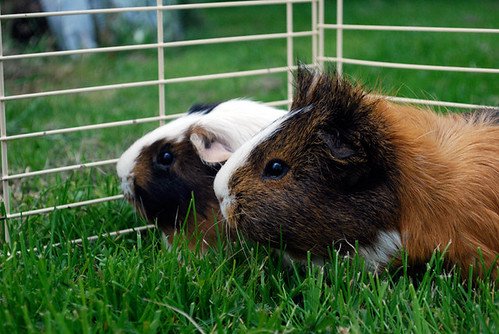
American guinea pigs, also known as cavies, are popular pets due to their friendly nature and relatively manageable care requirements. However, they are prone to certain health problems that can arise from genetics, poor diet, or inadequate living conditions. Let’s dive into those common health issues and explore how to spot them early and prevent them effectively.
Dental Issues
One of the most common health concerns for American guinea pigs is dental problems. Their teeth are continuously growing, which can lead to overgrowth if they don’t chew enough. When you think about it, it’s like us having to wear down our own teeth on tough food to keep them at a manageable length. If your guinea pig doesn’t have the right snacks, their teeth can become too long, causing discomfort or even making it hard for them to eat.
Look for signs like drooling, difficulty eating, or not eating at all. If you notice any of these, it might be time for a vet visit. To prevent dental issues, make sure you provide a varied diet that includes plenty of hay, fresh veggies, and chew toys designed for guinea pigs. This helps wear down their teeth naturally.
Respiratory Problems
Respiratory issues are another frequent concern for our furry friends. These problems can be triggered by environmental factors like dust, mold, or even cigarette smoke. Imagine being stuffed in a small room with poor ventilation and allergens—it wouldn’t feel great! Guinea pigs are sensitive to their surroundings, and breathing difficulties can arise if they’re not in a clean, well-ventilated space.
Watch out for symptoms such as wheezing, sneezing, or labored breathing. If your guinea pig sounds more like a little piglet than usual, it’s time to check their environment. To help prevent respiratory issues, ensure their living area is clean and free of dust and mold, and avoid exposing them to strong odors or smoke. Regular cleaning of their cage and using fresh bedding will make a significant difference.
Gastrointestinal Stasis
Gastrointestinal stasis is a serious condition that can affect guinea pigs, causing their digestive system to slow down or even stop. This is particularly concerning because guinea pigs need to eat to keep their digestive system functioning properly. If they stop eating, it’s like a car running out of gas—eventually, it just won’t work. Signs include reduced appetite, lethargy, and changes in fecal output.
To prevent gastrointestinal stasis, ensure your guinea pig has unlimited access to fresh hay and water. It’s also important to introduce new foods gradually, as sudden changes can upset their tummy. If you notice any symptoms, don’t hesitate to consult a vet. Quick action can make all the difference when it comes to your pet’s health.
Skin Issues
Skin problems can also plague American guinea pigs, with issues ranging from dry skin to fungal infections. These problems can be uncomfortable for your pet and impact their quality of life. Think about how much you scratch when you have dry skin—it’s the same for them! Common signs include excessive scratching, bald patches, or crusty areas on the skin.
To prevent skin issues, maintain good hygiene by regularly cleaning your guinea pig’s cage and checking their skin during handling. A balanced diet rich in vitamins is essential for healthy skin and fur, too. If you notice any skin abnormalities, it’s best to seek veterinary care. Early treatment can save your guinea pig from a lot of discomfort.
Obesity
Like many pets, guinea pigs can struggle with obesity, which can lead to a host of health problems. Imagine snacking on junk food all day—sooner or later, it would take a toll on your health. Guinea pigs tend to overeat if they’re not given the right portions or the right diet, which can lead to obesity. Signs include a noticeably rounder body, difficulty moving, or reluctance to play.
To combat obesity, it’s important to provide a balanced diet that focuses on hay, fresh vegetables, and limit high-calorie treats. Regular exercise is also key, so make sure your guinea pig has plenty of space to run around and explore. By promoting an active lifestyle, you can help keep your furry friend at a healthy weight.
Urinary Tract Issues
Urinary tract problems can be somewhat common, particularly in older guinea pigs. These issues can be caused by a combination of genetics, diet, and dehydration. If your guinea pig struggles to urinate or seems to be in pain while doing so, it might feel like a major red flag. You’d be worried if it was happening to you!
Preventing urinary issues involves providing plenty of fresh water and a balanced diet that includes a variety of veggies. Avoiding excessive calcium-rich foods can also help, as too much calcium can lead to bladder stones. Regular vet check-ups are key to catching any potential issues before they escalate.
The Importance of Regular Vet Check-ups
One of the best ways to keep your American guinea pig healthy is through regular veterinary check-ups. Just like you’d go to the doctor for a check-up, your pet needs that, too! These visits help catch health issues early when they’re easier to treat. It’s a bit like routine maintenance on your car—early detection can prevent bigger problems down the line.
During these vet visits, your guinea pig will receive a full health evaluation, and you can discuss any concerns. Building a good relationship with a vet familiar with small animals, especially guinea pigs, can make all the difference. They can guide you in preventive care and offer valuable advice to keep your furry friend thriving.
In conclusion, while American guinea pigs can be susceptible to several health concerns, knowledge and preventive care can go a long way in ensuring their well-being. By keeping an eye on their diets, environments, and habits, you can help your guinea pig enjoy a happy and healthy life. Remember, they’re not just pets; they’re part of the family!
